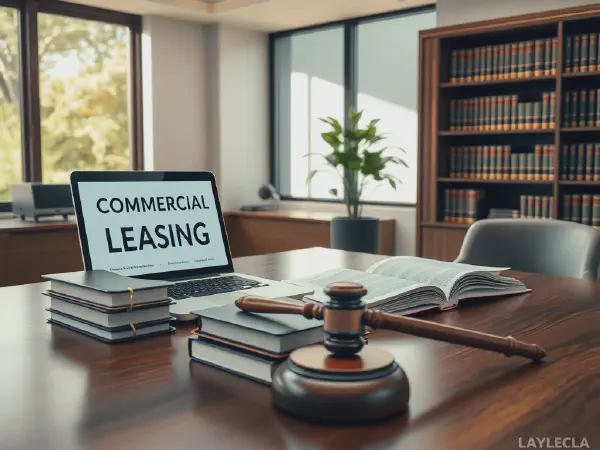Essential Guide to Hiring a Commercial Leasing Lawyer

The Essential Guide to Commercial Leasing Lawyers
A Commercial Leasing Lawyer plays a vital role in navigating the complexities of commercial real estate transactions, ensuring that businesses secure favorable lease agreements to meet their operational needs. Whether you are a landlord or a tenant, having legal representation can safeguard your rights and interests throughout the leasing process.
Commercial Leasing Lawyers specialize in the legal aspects of commercial real estate leasing. They provide invaluable support by understanding the nuances of commercial leases, which differ significantly from residential leases. Their expertise helps clients avoid common pitfalls and negotiate terms that align with their business goals.
When dealing with commercial leases, a Commercial Leasing Lawyer can guide businesses through various lease types, including gross, net, and modified leases. Each type has distinct characteristics and implications for the tenant and landlord, making it crucial for lease agreements to be clearly understood and negotiated. Lawyers can explain these differences and assist in drafting provisions that benefit their clients.
Finding the right support in business transactions is crucial, so consult experienced commercial leasing attorneys for guidance.
Moreover, Commercial Leasing Lawyers are critical in ensuring that lease agreements include key provisions that protect their clients’ interests. This may encompass terms regarding rent, maintenance responsibilities, duration of the lease, and options for renewal or termination, among others. Their attention to detail ensures that clients do not face unexpected liabilities during the lease term.
In addition, the expertise of a Commercial Leasing Lawyer extends to negotiating lease terms with landlords. Since negotiating commercial leases can often be complex, lawyers help clients to advocate for favorable terms based on industry standards, market conditions, and the unique needs of their business.
Understanding Commercial Leasing
Commercial leasing involves several types of leases, primarily classified as gross, net, and modified leases. A gross lease typically means that the landlord covers all property expenses, including utilities and maintenance, while a net lease requires the tenant to pay some or all of these expenses. Modified leases may include a mix of both arrangements. Understanding these types can affect budgeting and long-term planning for a business.
Key provisions in commercial leases also play a pivotal role. These may include terms related to occupancy, rent escalation clauses, tenant improvement allowances, and what constitutes a breach of lease. It’s essential for tenants and landlords alike to have a clear resolution process stipulated in the lease to mitigate potential disputes in the future.
Negotiating lease terms with landlords can greatly impact the operational success of a business. A Commercial Leasing Lawyer can provide insight into market trends and assist in negotiating terms that are not only fair but also tailored to the specifics of the tenant's business strategy, ultimately leading to a more harmonious landlord-tenant relationship.
The Role of a Commercial Leasing Lawyer
One of the primary roles of a Commercial Leasing Lawyer is to assist clients in lease negotiations, ensuring they have a fair chance at securing advantageous terms. This proactive approach can help prevent legal issues down the line and establish a strong foundation for the business's operational space.
Additionally, these lawyers offer legal advice on commercial property transactions, helping clients to understand their rights and obligations under the lease. This advice can be crucial in preventing misunderstandings that may lead to disputes, costly litigation, or lease termination.
Another significant function of a Commercial Leasing Lawyer involves providing dispute resolution services. In the event of a disagreement between landlords and tenants, having legal counsel can facilitate negotiations and reach amicable solutions, preserving relationships and minimizing disruptions to business operations.
Common Legal Issues in Leasing
Understanding lease breaches and remedies is vital for both landlords and tenants. A breach might involve failure to pay rent, subletting without consent, or violation of lease terms. A lawyer ensures that clients are informed about their rights and the remedies available to them in case a breach occurs.
Handling disputes with landlords or tenants can often be a contentious process. Commercial Leasing Lawyers can mediate and advocate for their client's interests, whether that involves pursuing legal action or negotiating a settlement to avoid the courtroom.
Knowing the procedures for commercial lease termination is another common legal issue. Lawyers can guide clients through the required processes and ensure that all legal obligations are met, minimizing the risk of potential disputes associated with lease termination.
Benefits of Hiring a Commercial Leasing Lawyer
Hiring a Commercial Leasing Lawyer can prove to be cost-effective in the long run. Their expertise can prevent costly mistakes and ensure that the terms negotiated are beneficial to the client's business, potentially saving money over the lease term.
Furthermore, lawyers provide expert advice on lease compliance, helping clients to adhere to legal statutes and industry regulations. This can prevent future litigation and associated costs, allowing businesses to operate smoothly without legal distractions.
Finally, the protection of business interests through legal guidance ensures that clients are not taken advantage of during negotiations. With a lawyer's support, businesses can secure leases that promote their interests and enhance their operational effectiveness.
Choosing the Right Commercial Leasing Lawyer
When selecting a Commercial Leasing Lawyer, it’s essential to consider several factors, including their experience, track record in commercial leasing, and their ability to understand the specific needs of your business. An ideal lawyer should have solid negotiation skills and a comprehensive understanding of local laws.
During initial consultations, potential clients should ask pertinent questions about the lawyer’s experience with similar cases, their approach to negotiations, and how they handle disputes. This information can provide insight into how well the lawyer may serve your specific needs.
Evaluating a lawyer's experience in commercial leasing involves looking at their past successes with similar clients, their familiarity with various types of commercial leases, and their overall reputation in the field. A qualified lawyer can make a significant difference in the leasing process, securing beneficial terms that support the client’s business objectives.
